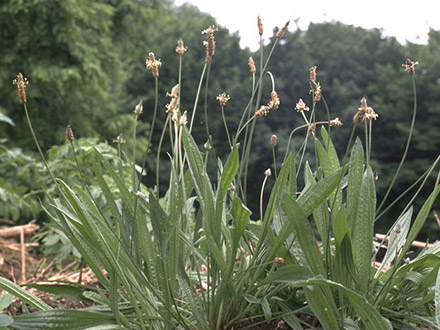Botanical name
Ribwort plantain, English plantain, and narrowleaf plantain - Plantago lanceolata L.
Family
Plantain family (Plantaginaceae)
Information about the plant
Plantain is found in all temperate climates around the world and mainly grows in meadows and pastures, often on roadsides and ruderal like rubble piles. The genus name Plantago, derived from Latin "planta" (= foot sole, foot face) with the common suffix of plants "ago" refers in part to the flat, oval leaves of the plantain (P. major) lying closely on the ground in rosettes, on the other hand that the plantain is formed by being trampled by feet. The long-lanceolate and typical parallel leaves of the plantain are referred to in the epithet lanceolata (from the Latin "lanceolata" = small lance). They are numerous in a basal rosette, about 20 inches long and in comparison with the leaves of the plantain they are partly erect. The small flowers are in dense, cylindrical spikes at the end of long leaves standing out from furrowed scapes. They flower from bottom to top, which is easy to recognise from the yellowish white stamens outstanding from the corolla. Flowering period is May to September.
Medicinally used parts of plants (herbal drug)
The leaves and scapes are used whole or crushed. The commercial drug is mostly from farms in Eastern European countries and a small part of Holland.
Constituents of the herbal drug
Ribwort plantain leaves contain mucilage, iridoid and phenylethanoid.
Quality of the drug
The quality of plantain leaves (Plantaginis lanceolata folium) is specified in the European Pharmacopoeia (Ph. Eur.).
Medical applications
Recognised medical use
Internally for catarrh of the respiratory tract and inflammatory lesions of the oral and pharyngeal mucosa. Externally for inflammation of the skin (Commission E, ESCOP).
Traditional use
Traditionally used to strengthen the respiratory system (traditional use in accordance with § 109a).
Herbal drug preparations in finished dosage forms
- cut drug to prepare tea
- dried extract in juice
- fluid extract in juice and drops
- fresh plant juice as juice
Dosage
Prepared drugs: see package insert;
Tea infusion: drink a cup of ribwort plantain tea three times a day; average daily dose in adults and adolescents 3 to 6g of the drug, children under 6 years 2 to 4g of the drug.
Preparation of a tea
Pour 150ml of boiling water over 2 to 4g of chopped plantain leaves with and strain after 10 to 15 minutes. To make better use of the mucilage of the drug put the infusion in cold water, strain after 2 hours and bring briefly to the boil.
Notes
There is currently no experience on the safety of the use of plantain during pregnancy and breast-feeding. Its use against coughs in children under 4 years old is not recommended, seek medical advice.
Side effects
None known
Interactions
None known
References
Herbal drug monographs
Further literature
Wichtl: Teedrogen und Phytopharmaka, pg. 514
Schilcher: Leitfaden Phytotherapie, pg. 248
Van Wyk: Handbuch der Arzneipflanzen, pg. 246
Kommentar zum Europäischen Arzneibuch (Ribwort plantain leaves, no. 1884)


